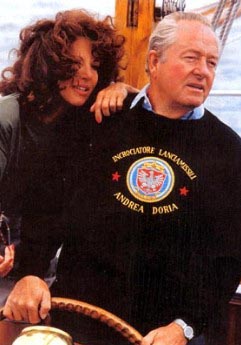Le Pen’s Notorious “Detail” Remark About World War II
Jean-Marie Le Pen, leader of France's National Front party, stunned the world on April 21, when he came in second in the French presidential race, to challenge the incumbent Jacques Chirac in the May 5 runoff election. Press coverage of the veteran nationalist political figure has been more than unfriendly; he has been maligned with outright falsehood. It is widely claimed, for example, that he once dismissed “the Holocaust” as a “detail” of history. Typical is a widely published Associated Press report of April 21, which told readers that Le Pen “is notorious for describing the Holocaust as `a detail' of history.” Even the reputable BBC “World Service” has repeated this claim.

Jean-Marie Le Pen
What are the facts?
On two occasions Le Pen has referred to Nazi “gas chambers” — not “the Holocaust” — as a “detail” or “minor point” (point de detail) of World War II. During an interview in September 1987, he said:
“Do you want me to say it is a revealed truth that everyone has to believe? That it's a moral obligation? I say there are historians who are debating these questions. I am not saying that the gas chambers did not exist. I couldn't see them myself. I haven't studied the questions specially. But I believe that it is a minor point point de detail in the history of the Second World War.”
On the basis of France's 1990 Fabius-Gayssot law, which makes it a crime to “contest” the “crimes against humanity” as defined by the Nuremberg Tribunal of 1945-1946, Le Pen was brought to trial. After a drawn-out court battle, he was convicted by a French court and fined $200,000.
Ten years later, during a visit to Munich on Dec. 5, 1997, Le Pen was asked about his 1987 remark. He replied by saying “There is nothing belittling or scornful about such a statement,” and then added: “If you take a book of a thousand pages on the Second World War, in which 50 million people died, the concentration camps occupy two pages and the gas chambers ten or 15 lines, and that's what's called a detail.”
Seventeen organizations — including the Simon Wiesenthal Center and the “Movement Against Racism and for Friendship Among Peoples” — promptly responded by filing a formal legal complaint. On Dec. 26, 1997, a Paris court sentenced Le Pen for this second “detail” remark. It ordered him to pay $50,000 to publish the text of the court's decision in a dozen French newspapers, and to pay a large amount of money to eleven of the organizations that had brought the complaint.
In a December 1997 interview Le Pen said that he would no longer speak publicly about Nazi gas chambers because nonconformist views on this subject are prohibited by law. “I won't respond any more,” he explained. “It's a taboo subject that is protected by legal and criminal law, and the only opinion one can express about it is that allowed by law.” (See French Courts Punish Holocaust Apostasy, March-April 1998 Journal of Historical Review)
What no major newspaper or news service has bothered to mention is that Le Pen's “detail” remark is valid. As French revisionist scholar Robert Faurisson has noted, neither Dwight Eisenhower in his 559-page World War II memoir, Crusade in Europe, nor Winston Churchill in his six-volume history, The Second World War (4,448 pages), nor Charles de Gaulle in his three volume Mémoires de guerre (2,054 pages), makes a single mention of Nazi “gas chambers,” or of a “genocide” of the Jews, or of “six million” Jewish victims of the war. (See The Detail, by R. Faurisson, also in the March-April 1998 Journal of Historical Review.)
What is “notorious” is not Le Pen's valid remark about gas chambers, but rather that he was brought before a court and punished for having made it (and on the basis of an Orwellian French law), and that the media misrepresents, without censure, what he actually said.
Mark Weber is the Director of the Institute for Historical Review
Bibliographic information about this document: The Revisionist # 13, Oct. 2002, Codoh series
Other contributors to this document: n/a
Editor’s comments: n/a
